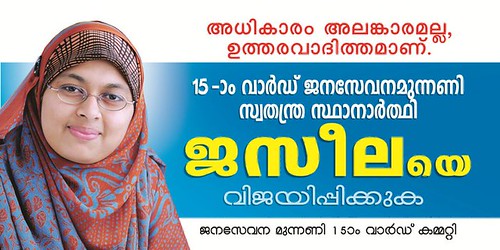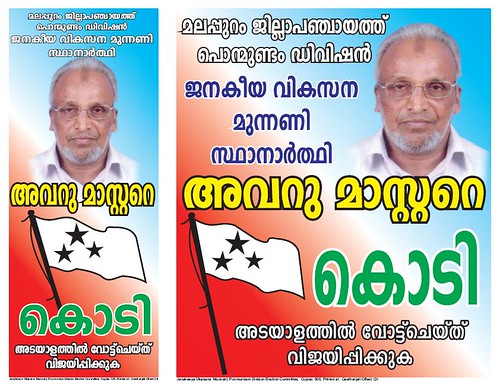By TwoCircles.net Staff Correspondent,
When Kerala goes to polls on October 23 and 25 to elect the new representatives to the local bodies, the presence of newly-formed parties and alliances cannot be underestimated. The Vikasana Munnani, a new experiment of local groups formed on the strong demand for development without corruption. The alliance has jumped into the fray with the slogan ‘Vote for Change’.
The alliances for development (the literal meaning of Vikasana Munnani) have been formed under the auspices of the state Jamaat-e-Islami in different names such as the Janakeeya Vikasana Munnani, Janapaksha Munnani, Janasevana Munnani etc, commonly known as Vikasana Munnani. It aims at ridding the administration of villages and towns off the over-emphasis given to politics and off the hands of sectarian politics, to bring the benefits of development to the actual benefactors, to end the ruthless conquest of the nature, etc and thus to give a new face to democracy through popular interventions. The local alliances are formed in different places raising local issues and cooperating with local people, clubs, social activists etc.

Poster of Jaseela who is contesting in the 15th ward in Manjeri Municipality
The Munnani is contesting in 1751 wards all over the state, in five corporations, 35 municipalities, 329 village panchayats, 46 district Panchayat divisions and 114 block Panchayat divisions. There are 738 women candidates. The Munnani is also fielding 73 non-Muslims. Most number of candidates are contesting in the Malappuram district – 651. A total of 1191 candidates are contesting in the Malabar area, which consists of six northern districts – Kasargode, Kannur, Wyanad, Kozhikode, Malappuram and Palakkad.
Why new alliance?
The Panchayati Raj system puts forward an idea of local bodies being administered by the cooperation of all parties, aiming at the development of the village/town. But the over-sectarianism in the name of politics which is present everywhere in Kerala has not left the local bodies also. Parties contest with each other to win the elections, and even if a party wins there will be factional fights within the party which lead to even a stoppage of smooth administration. Even the names of projects are politicized by giving the names of parties’ late leaders, which make it difficult to continue the project if another party is in power later.
In Kerala, the Jamaat-e-Islami earlier supported candidates from both the LDF and the UDF, considering their ability, values etc. In the last general elections and the Assembly elections, the organisation gave complete support to the LDF, barring only two seats to the Parliament. However, giving support to the LDF did not stop the organisation from critically analyzing the government and this led to strong criticism in certain matters such as the Kinalur Road issue and the NH land acquisition which were widely noted. Solidarity Youth Movement, the youth organisation sponsored by the Jamaat, was in the front in all these popular struggles. When it saw that the Jamaat was turning against its policies, the CPI (M) began to accuse the organization of terrorism and its senior leaders including general secretary Pinarayi Vijayan attacked the organisation in all venues. The party’s mouthpiece ‘Deshabhimani’ newspaper even published a series against the Jamaat. Meanwhile, the talks held between the Jamaat and the Muslim League in May this year created headlines which led the League to declare that the party would have no ties at all with the organisation as it was entering electoral politics.
“The Jamaat decided to form alliances in local level in panchayats and municipalities, cooperating with local clubs, youth and service groups, environment and human rights organizations, anti-alcoholism organizations, Dalit groups and social activists. The concept is that of a popular local gathering”, said C Davud, member of Jamaat-e-Islami political cell, to TCN.
In the highly politically-charged atmosphere in Kerala, doubts will naturally be raised on the scope of a party or local alliance with no political orientations, or without alleging itself to the LDF or the UDF. C Davud says, “It is said that there is no scope for a party which is not included in any of the fronts. And what we are doing is trying to make such a scope. We could field candidates in more than 1700 wards. There is very strong competition in many places – triangular competition in more than 1000 wards and direct competition in around 600. So creating such alliances and having good competition itself is proof for that scope.”
Majority of these popular alliances are formed in villages, with an aim to bring development with the support and cooperation of the local people, and to get rid of the menace of corruption. Local bodies can be of great help in the development of the state from the local level itself. But, local level development has got the big hurdle of sectarian politics and corruption. As a study revealed, even the ‘Janakeeyasoothranam’ programme which was introduced with a view to democratize the lowest level actually was successful in only democratizing corruption in the lowest levels.
The Munnani works in cooperation with the Janakeeya Aikya Vedi, launched as a public platform of several local alliances and groups which are trying their hand in the local body elections. They put forward the common slogans of local development, popular needs, local demands etc. The Munnani has no sectarian allegiances, but cooperates with different parties and sections in different places. “Adjustments are made in the local level considering development, local issues etc. There are adjustments with the CPI (M), Congress and the Muslims League and also with the BSP and the Dalit Human Rights Movement in some places. However, there are no such things at all with the BJP and the SDPI. That is the decision of the Janakeeya Aikya Vedi also.”
Women representation
Another specialty of this election is the 50% reservation for women in all the bodies. This would result in the victory of 489 women as Panchayat presidents. A total of 605 local bodies will be headed by women. Women will be the presidents in 76 block panchayats, 30 municipalities, three corporations and seven district panchayats. However, all political parties found it really hard to find suitable candidates to contest in this number of wards.

Election campaign poster of Avaru Master who is contesting to the Malappuram district Panchayat from the Ponmundam Division
The Jamaat had organized a state women’s conference in January this year in which about 2 lakh women participated. The conference held at Kuttippuram in Malappuram was totally controlled and organized mainly by women alone. The Jamaat’s programmes for women empowerment grew stronger by the success of the conference. Hence, finding female candidates would not have become a big problem for the organisation when the elections were announced with 50% reservation for women.
Muslim League
The Muslim League is a strong political party in the state, with the Malappuram district being its stronghold. The party was very hopeful about the local body elections, as the people must naturally be fed up of the ruling party. While it was hoping for an easy walk-over in the district, there came the hurdles from the Janakeeya Munnani of the Jamaat and the Social Democratic Party of India. There are indeed concerns that three parties from the Muslim side may divide Muslim votes, and the result may be helpful for communal forces like the BJP. “But the Vikasana Munnani is not only for Muslims, it is fielding several non-Muslims also as candidates” says C Davud. “There is indeed a chance for the division of Muslim votes, but that won’t be much of a problem in Malappuram district.” Instead, Davud noted some changes that took place when the Munnani began to field its candidates. “Other fronts and parties have begun to field Muslim candidates in the southern districts. We can also see even women contesting in the party symbol of the CPI (M) wearing the purdah and scarf.” He added that they were taking the necessary precautions in certain places where the candidature of the Munnani might help the BJP.
Candidates supported by the Jamaat had contested in the last local body elections and won a few seats, among which the most important is the victory in Shanthapuram and Mullyakurshi wards in Keezhattoor Panchayat in Malappuram. The decision to contest elections all over the state now was taken after the positive results in the wards which the organisation had won last time, state Amir T Arifali said in a press conference earlier.
A total of 70,915 candidates are contesting in 22,000 wards all over the state. The last elections to the local bodies were held in September 2005. Both the fronts are hopeful in their own specific regions. But competition is tight as always and there is the threat of rebels also. In addition, come the new parties and alliances. However, let’s wait and see whose will be the final smile when the votes will be counted on October 27.

